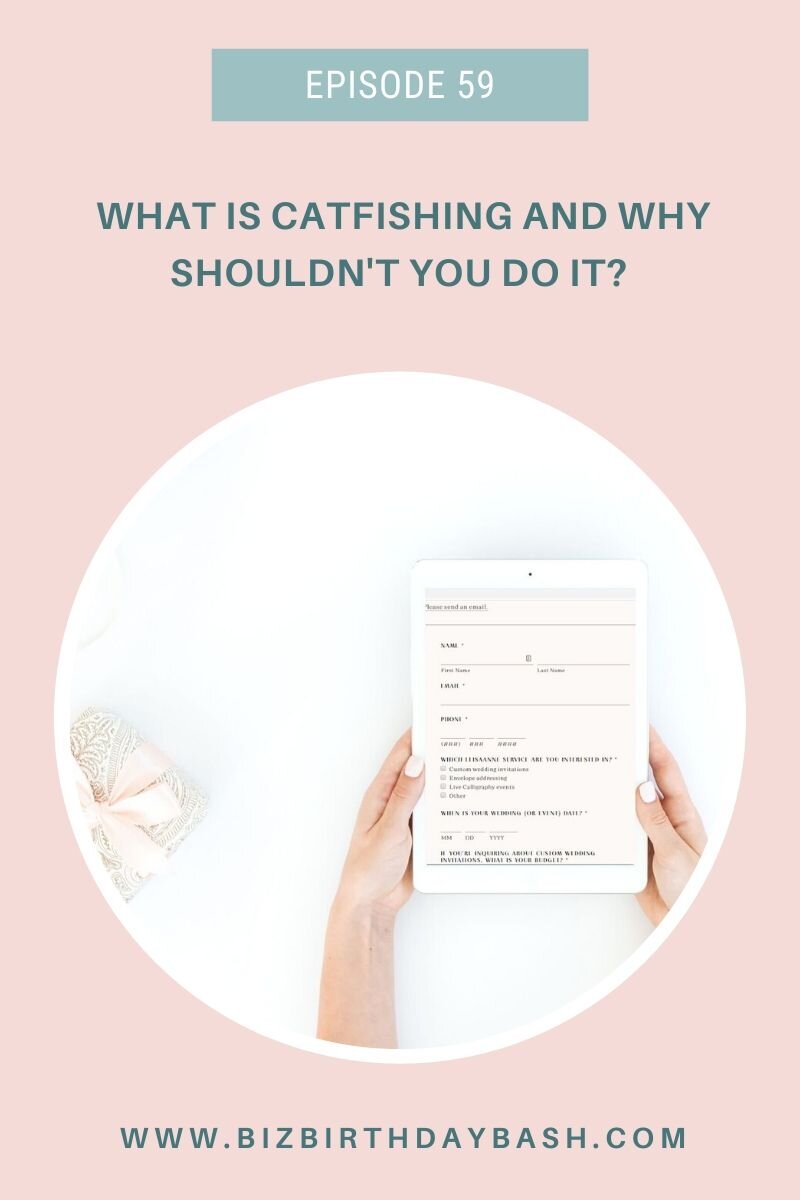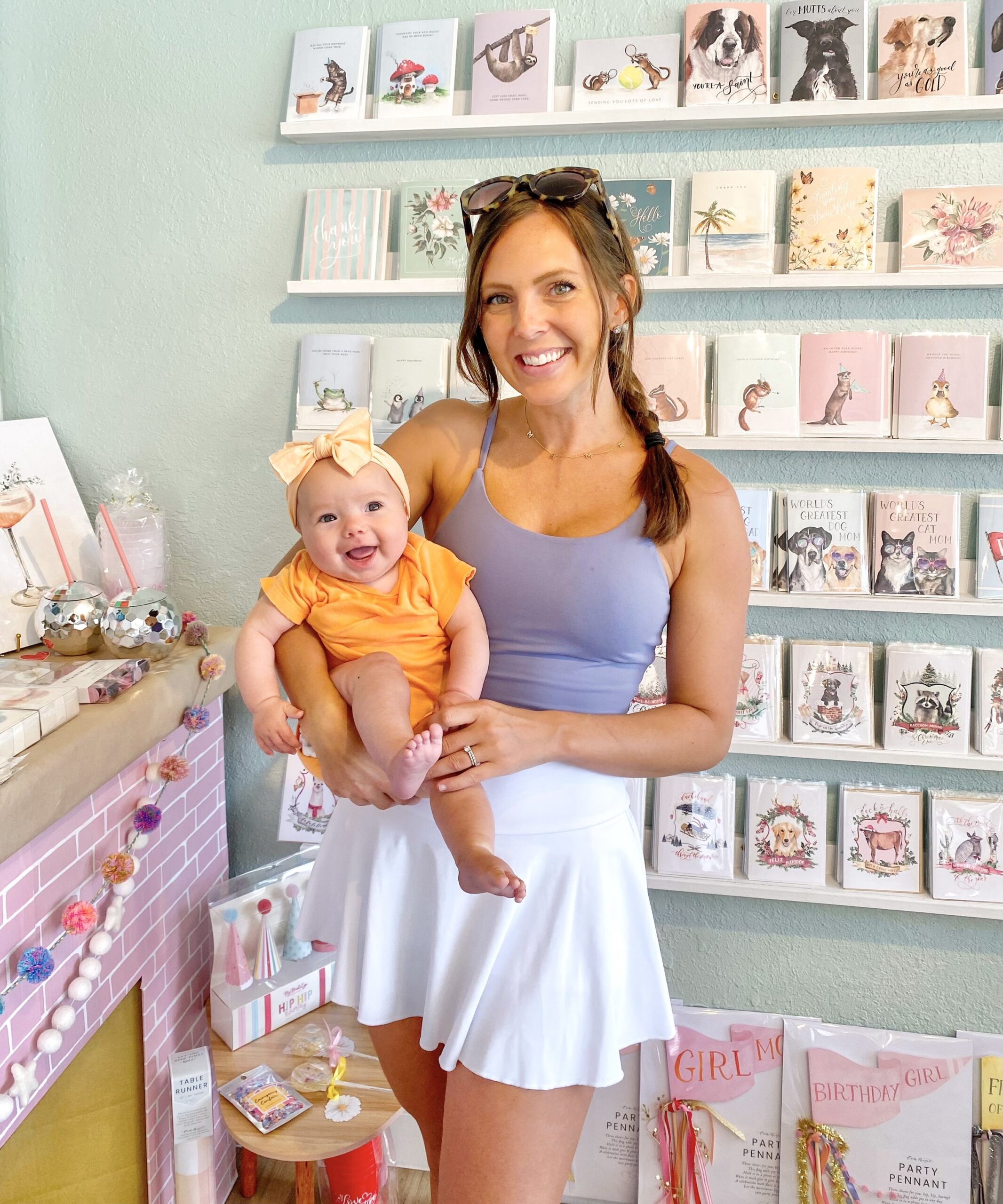Have you ever catfished a fellow creative? In today’s episode, we’re covering this taboo topic and explaining why it’s not okay to pose as a potential client in order to get a behind-the-scenes look at another business owner’s pricing information or client processes. If you have done something like this in the past, rest assured that we are not here to judge. We all make mistakes, and We just want this episode to serve as a guide that helps you avoid putting yourself in sticky situations in the future. Plus, we want to point you in the direction where you can get the resources you need without being slimy or underhanded.
Listen in to learn more about catfishing as it pertains to the creative industry, how you can go about finding resources in a better way, and how you can spot the red flags and protect your business assets if you happen to be catfished in the future.
Let’s be friends! Find us on Instagram http://instagram.com/bizbirthdaybash @bizbirthdaybash.
What is Catfishing?
Catfishing, defined in the most simple terms, is pretending to be someone you’re not. Google’s definition is to lure (someone) into a relationship by means of a fictional online persona.
Elisabeth 2:39
So basically, if you have inquired through someone’s online forum and made up a fake name, email, wedding day, etc. to find out how the other creative or stationer operates and does their process then you have sadly catfished them. And like we said, no guilt if you have done this before. But this is why we’re talking about this to set up some good expectations and practices going forward.
Why is Catfishing a Bad Idea?
Let’s talk about why this is a BAD idea for a couple reasons:
1. You’re (even if it’s unintentional) giving that person false hope that they just received a REAL inquiry for a client that could hire them & bring in money
Cami 3:54
Okay, so number one, you’re giving that person false hope that they just received an actual inquiry for a client that would actually hire them and bring them in money. So even if you’re unintentionally doing this, like you’re just in this, like, think about how excited you get when you get an inquiry, you’re like, Oh my gosh, this could be my next client. Like, I get excited for every inquiry that comes my way every single lead, because I’m like, this is someone else to get the services that our client this pays the bills blue, and then you’re going to get a really crappy feeling when you find out one, this is not a real inquiry because like, Hey, now you’re not gonna be able to pay money and you just wasted your time putting together a proposal or whatever we know those take quite a bit of time, especially in the stationery industry. You just wasted your time putting together for a fake person who wasn’t planning on purchasing from you in the first place. They’re just trying to get your pricing. So you’re giving out false hope. That’s not good.
2. You’re breaking trust with that vendor immediately if they find out what you’ve done
This can be fixed — if you’ve done this and you’ve been caught & confronted, you should immediately apologize.
Elisabeth 10:31
If you come back and apologize and you’re like, I just didn’t understand like, I didn’t know like, that’s fine. Like, but if you know and you know you’re doing it then like, it is going to tarnish things a little bit. So yeah, it’s gonna make people upset and granite like, your clients might never know you’re doing this. But I really think that there’s a lot of availability to get like referrals from people in the industry if you’re building relationships correctly, and doing business the right way.
3. You’re lying to get something you want, and is that really the precedent you want to set?
Cami 8:12
If you are catfishing, you are essentially lying to get something you want and is that really the precedent you want to set? By doing this you are inadvertently hurting the industry and lying to people in the process. Which is not a good way to set yourself up for success in the long run.
4. You’re breaking the golden rule: Do unto others as you would have them do unto you
Elisabeth 14:19
This is kind of like you’re breaking the golden rule. Basically, this is why it’s a bad idea because we always say do to others as you want to have done to you. And as you build your business and work hard to make it grow, do you want people to do this to you in the future? The answer is probably no. So even if you’re a beginner and you’re starting out right now and you’re trying to do research, and this is one of the approaches you’ve taken, it’s going to feel really crappy. If somebody does this to you down the road. You have to put yourself in their shoes of like, how are they going to feel if they realize that this information I’m submitting is fake, and that I’m just trying to get something out of them. Yeah, it’s not going to be good. good feeling.
5. If you do end up receiving pricing from that vendor, is it really going to benefit you at all?
Cami 18:28
if you do end up receiving pricing from that vendor, is it actually going to benefit you at all? And the answer to this is no, because you have no idea how they structured that pricing, their wholesale vendors or how much their costs actually are or the thought process that went into it. So copying, utilizing the pricing in your own business means you have a plan, absolutely avoid a strategy because you don’t understand the reasoning behind it or anything about that. That person’s business. And we talked about this a lot that you should have your own pricing setup.
Do not look around at everyone else’s stuff and exactly copy it. You can look at pricing so you can determine the market value for something, like this is going for this kind of thing. But even still, the way you run your business is completely different than the way this person runs her business like Elizabeth and I have totally different pricing structures, like totally different ways of doing things we charge differently for different things like and we have a similar business model, I would imagine, but totally different pricing things. So you’re still not going to benefit yourself by even getting their pricing except that now you know, their pricing, good job.
Red Flags and Warning Signs that Might Help you Spot a Catfisher
1. The inquirer picks a seemingly unrealistic wedding date
20:35 Cami
I think one of mine has been when they just like, pick a date that’s like their wedding day is like a month away or something or it’s like a month away on like a Monday. Like they just randomly pick something, you know, I mean, like, so I always check to see if like the date is actually like on a Saturday or Sunday, which sometimes it’s not at all but it’s like far enough away where I’m like, Okay, this person could legitimately be inquiring about wedding invitations, versus if it’s like, next week, you know, Mm hmm. kind of thing.
2. They provide vague information the inquiry form
Cami 22:07
It’s very sparsely filled out with terms of details, because typically my clients will be like, I have the venue and I love this. I saw this on your Instagram, ah, like, they write really long things. Like when they’re thinking or like, I love these colors or like, whatever they are like, I’m thinking about doing this and this and this and my map, like, it’s very specific, or, you know, there’s lots of stuff going on. And so if it’s very, like sparsely filled out, and I’m like, Hmm, interesting, right? Also, if it’s like a very, like, even quantity, like 100 sometimes I feel I mean, that’s not like a super red. That’s like a yellow flag. Like all these things like that would be added in there.
3. They inquire about ALL of Your Services
Elisabeth 22:50
That’s probably a big one too, when like, everything is checked off and you’re like, Oh, wait, you want pricing for everything? Which isn’t an option on my form anymore because I walked through all of that during their consultation call and I fill out that form for them to be like, Okay, this is what this is. And do you want this? And do you want that? But you’re right. Like that would be really weird to be like, Oh, they literally want everything but they put like $1,000. Which also granted, people have done that before who are legitimately inquiring.
4. Weird Contact Information
If the inquirer’s name doesn’t match their email address that’s a red flag. Also, if their phone number seems fake or “off” that can be a red flag as well.
What should you do instead for Market Research?
27:01
-
First, it is OK to research your competitors and see how they have set up their inquiry forms. Those are accessible to the public (anyone) and that’s fair game. It is NOT ok to copy that form directly or fill it out to see what happens (unless you have written permission from that creative in the form of an email).
-
If you come across a form you love and you’re curious about the process after it, do some due diligence first to see if that creative and business owner has offered any education through podcast episodes, courses, YouTube videos, blog posts, etc.
-
Reach out to CRM platforms such as Dubsado and Honeybook and ask them to guide you through an inquiry workflow example. These companies have a ton of free tutorials online that you can take advantage of!
-
If you really have to know how someone’s forms or processes work, reach out to them directly to be upfront and ask some questions. Offer to PAY for a mentoring or coaching session, don’t just ask a ton of questions and expect them to be answered for free.
-
You have to start somewhere. Maybe you’re not confident about your inquiry process, but do you know how you best learn? By starting and experimenting to see what works and what doesn’t. That’s what Cami and I have done all these years! The more times someone goes through your inquiry process, the more you can test it and tweak it.
-
Build your inquiry process and do a dry run with a friend or family member! Have them fill out your form and give you feedback. Even create a proposal for them if you want!








+ show Comments
- Hide Comments
add a comment